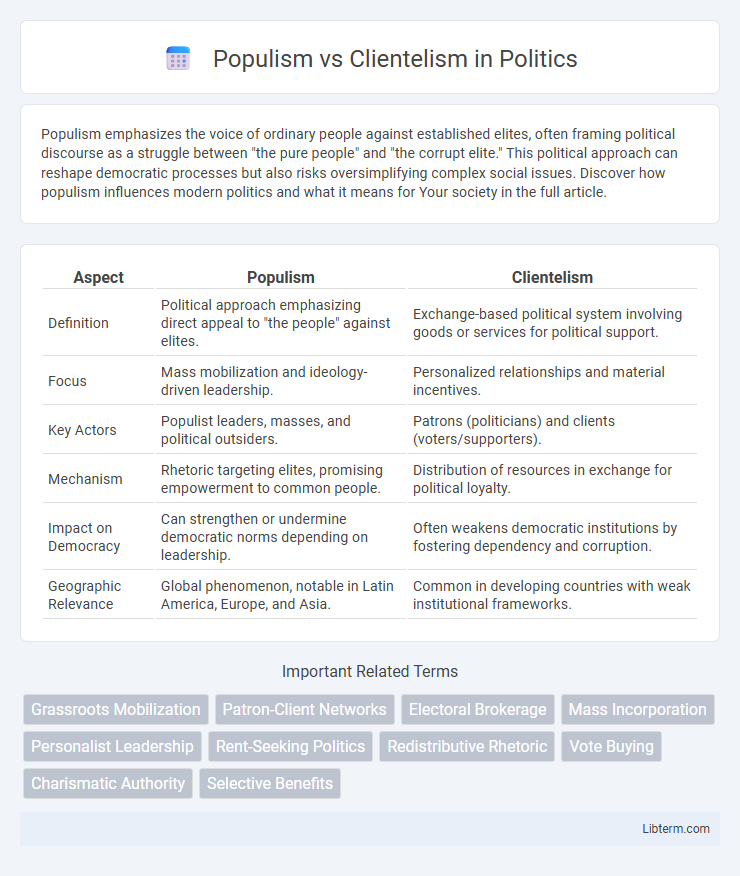Populism emphasizes the voice of ordinary people against established elites, often framing political discourse as a struggle between "the pure people" and "the corrupt elite." This political approach can reshape democratic processes but also risks oversimplifying complex social issues. Discover how populism influences modern politics and what it means for Your society in the full article.
Table of Comparison
| Aspect | Populism | Clientelism |
|---|---|---|
| Definition | Political approach emphasizing direct appeal to "the people" against elites. | Exchange-based political system involving goods or services for political support. |
| Focus | Mass mobilization and ideology-driven leadership. | Personalized relationships and material incentives. |
| Key Actors | Populist leaders, masses, and political outsiders. | Patrons (politicians) and clients (voters/supporters). |
| Mechanism | Rhetoric targeting elites, promising empowerment to common people. | Distribution of resources in exchange for political loyalty. |
| Impact on Democracy | Can strengthen or undermine democratic norms depending on leadership. | Often weakens democratic institutions by fostering dependency and corruption. |
| Geographic Relevance | Global phenomenon, notable in Latin America, Europe, and Asia. | Common in developing countries with weak institutional frameworks. |
Defining Populism: Key Features and Origins
Populism is characterized by a political approach that seeks to represent the interests of ordinary people against a perceived elite or establishment. Its key features include a charismatic leader, appeals to popular sovereignty, and often a dualistic worldview dividing society into "pure people" versus "corrupt elites." Originating from late 19th-century agrarian movements, populism has evolved globally to address diverse social and economic grievances through direct mass appeal and anti-elitist rhetoric.
Understanding Clientelism: Mechanisms and Evolution
Clientelism operates through reciprocal exchanges where political support is traded for material benefits, relying on personalized relationships and patronage networks to secure loyalty. This mechanism evolves as parties adapt to changing social dynamics and mobilization strategies, often embedding itself in local institutions and informal systems. Understanding clientelism requires analyzing its role in maintaining power structures by reinforcing dependency and limiting democratic accountability.
Populism vs Clientelism: Core Differences
Populism centers on mobilizing broad public support by appealing to the "common people" against elite groups, emphasizing ideology and mass political engagement. Clientelism operates through personalized, reciprocal relationships where politicians exchange material benefits for voter loyalty, often limiting political participation to direct networks. The core difference lies in populism's collective mobilization versus clientelism's individualized, transactional nature of political support.
Historical Contexts Shaping Populism and Clientelism
Populism often emerged in the late 19th and early 20th centuries as a response to industrialization and political exclusion, appealing to the "common people" against elites, evident in movements across Latin America and the United States. Clientelism traces its roots to traditional patron-client relationships found in agrarian and pre-modern societies, where political support was exchanged for material benefits, sustaining power through personalized networks, notably in Southern Europe and post-colonial states. Both phenomena reflect historical socio-political structures but differ as populism centers on broad political mobilization and ideology, while clientelism focuses on localized, transactional relationships.
Political Strategies: Mobilizing Support in Populism and Clientelism
Populism mobilizes support by appealing directly to the masses through charismatic leadership and anti-elite rhetoric, emphasizing a unified "people" against perceived adversaries. Clientelism secures political backing by exchanging goods, services, or favors for votes, creating personalized networks of reciprocal loyalty between politicians and constituents. Both strategies rely on establishing strong bonds with supporters but differ fundamentally in outreach, with populism fostering broad ideological appeals and clientelism focusing on targeted, material incentives.
Economic Impacts: Populist vs Clientelist Policies
Populist economic policies often emphasize broad social welfare programs and protectionist measures aimed at redistributing wealth and appealing to the general populace, which can lead to short-term economic boosts but risk long-term fiscal instability. Clientelist policies allocate resources and government favors selectively to specific groups or individuals in exchange for political support, undermining market efficiency and perpetuating inequality by distorting economic incentives and limiting competition. The economic impact of populism tends to be characterized by volatile fiscal management, while clientelism entrenches rent-seeking behavior and hampers inclusive economic growth.
Democracy and Governance: Influence of Populism and Clientelism
Populism and clientelism significantly impact democracy and governance by shaping political behavior and institutional quality. Populism often challenges established democratic norms by promoting majoritarian rule and undermining checks and balances, while clientelism fosters dependency through the exchange of goods for political support, weakening institutional accountability. Both phenomena contribute to democratic erosion by distorting representation and perpetuating unequal power dynamics within governance structures.
Case Studies: Global Examples of Populism and Clientelism
Populism often manifests as leaders appealing directly to "the people" against established elites, seen in cases like Venezuela under Hugo Chavez, where charismatic rhetoric mobilized mass support. Clientelism, characterized by reciprocal exchanges between politicians and voters through targeted favors or resources, is evident in regions such as the Philippines, where political patronage sustains local power networks. Comparative analysis of these cases reveals that populism relies on ideological narratives, while clientelism operates through personalized, transactional relationships.
Challenges in Distinguishing Populism from Clientelism
Populism often emphasizes charismatic leadership and direct appeals to 'the people,' while clientelism relies on personal networks and reciprocal exchanges of goods or services for political support, making their overlap challenging to disentangle. Both phenomena exploit personalistic politics and erode institutional norms, complicating differentiation in empirical research and policy responses. The challenge lies in distinguishing populism's ideological mobilization from clientelism's transactional nature, especially in hybrid political systems where both coexist and reinforce political patronage.
Future Trends: The Changing Landscape of Populism and Clientelism
Future trends indicate a shifting landscape where populism increasingly leverages digital platforms to mobilize mass support, contrasting with clientelism's persistence in localized, resource-based political exchanges. The rise of social media algorithms and data analytics enhances populist leaders' ability to target and influence broad audiences, while clientelism adapts through more sophisticated patronage networks embedded in emerging economies. These dynamics suggest a complex interplay where populism's mass appeal coexists with clientelism's enduring personalized political strategies, reshaping governance and electoral processes globally.
Populism Infographic

 libterm.com
libterm.com